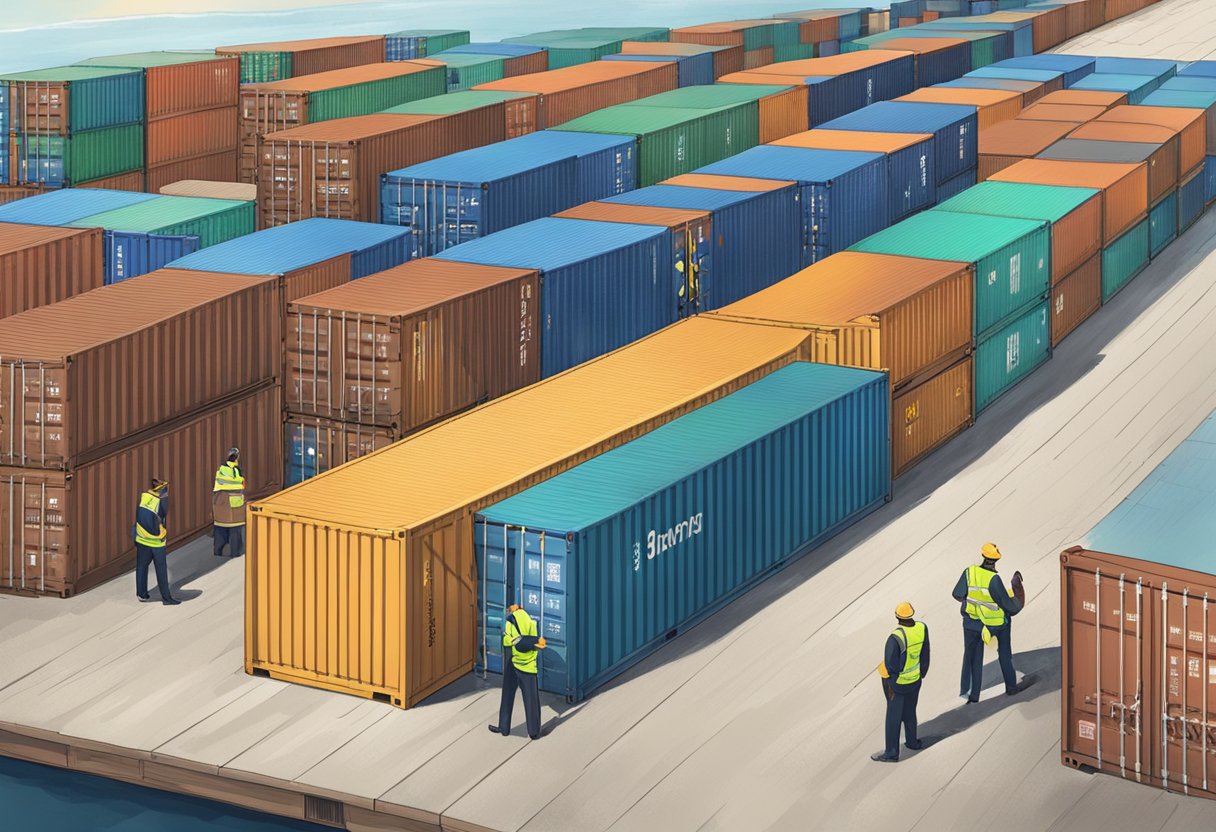Navigating Brexit: Changes in Post-Trade Regulations
Learn about the changes in post-trade regulations due to Brexit. Discover the challenges, opportunities, and potential impact on the industry.


Brexit has been a topic of discussion since the referendum in 2016. The United Kingdom's exit from the European Union (EU) has brought about significant changes in trade regulations. The transition ended on December 31, 2020, and the UK and EU began to forge a new, evolving partnership with implications for their global partners. The changes in post-trade regulations have created challenges for businesses and individuals alike.
Understanding Brexit and Its Implications
Brexit has brought about a significant shift in trade regulations, which has impacted businesses and individuals in the UK and the EU. The UK has left the EU's single market and customs union, which has led to changes in how goods and services are traded between the UK and the EU. The UK is now free to negotiate trade deals with other countries and has already signed agreements with several countries.
Post-Brexit Trade Regulations
The UK and the EU have agreed to a new trade and cooperation agreement on January 1, 2021. The agreement covers trade in goods and services and other areas such as transport, energy, and fisheries. The agreement has brought about changes in customs procedures, tariffs, and rules of origin, which have created challenges for businesses and individuals involved in trade between the UK and the EU.
Key Takeaways
- Brexit has brought about significant changes in trade regulations, which have impacted businesses and individuals in the UK and the EU.
- The UK and the EU have agreed to a new trade and cooperation agreement, which came into effect on January 1, 2021, and covers trade in goods and services and other areas such as transport, energy, and fisheries.
- The changes in post-trade regulations have created challenges for businesses and individuals involved in trade between the UK and the EU, including changes in customs procedures, tariffs, and rules of origin.
Understanding Brexit and Its Implications

Brexit refers to the United Kingdom's decision to leave the European Union (EU). The UK officially left the EU on January 31, 2020, and entered a transition period ending on December 31, 2020. During the transition period, the UK continued to follow the EU's rules and regulations, but it no longer had a say in the EU's decision-making process.
The implications of Brexit on UK trade are significant. The UK's departure from the EU means that it is no longer a member of the EU's single market and customs union. This means that UK businesses will face new trade barriers, such as customs checks and tariffs when trading with the EU.
The UK has been negotiating new trade agreements with third countries, such as the United States, to mitigate these barriers. However, these negotiations have been complicated by the UK's desire to maintain a close relationship with the EU while pursuing new trade deals.
According to its supporters, one of the main benefits of Brexit is that it gives the UK the power to negotiate more favourable trade arrangements with countries outside the EU, unencumbered by EU rules. However, the UK's ability to secure these deals may be limited because it is no longer part of the EU's single market and customs union.
The UK and the EU have agreed on a Trade and Cooperation Agreement (TCA), which sets out the terms of their future relationship. The TCA covers many issues, including trade in goods and services, intellectual property, and fisheries. However, the TCA does not provide frictionless trade between the UK and the EU, and businesses on both sides of the Channel must adjust to new trade barriers.
Brexit has significant implications for UK trade and the UK's relationship with the EU. The UK must navigate new trade barriers and negotiate new trade agreements with third countries while maintaining a close relationship with the EU.
Post-Brexit Trade Regulations

Since the UK left the European Union (EU), it has been negotiating independent free trade agreements (FTAs) for the first time in half a century. While tariffs are still necessary, reducing regulatory trade barriers has become central to modern trade deals.
The UK and the EU have agreed on a trade deal that governs their future relationship. The EU-UK Trade and Cooperation Agreement (TCA) took effect on January 1, 2021, covering trade in goods and services. The TCA has eliminated most tariffs and quotas on goods traded between the UK and the EU. However, the agreement does not cover financial services, and the UK has lost its passporting rights, which allowed financial firms to operate across the EU.
The TCA also includes provisions on rules of origin, which determine the country of origin of a product. Goods must meet the TCA's rules of origin requirements to qualify for zero tariffs. The agreement also includes provisions on trade remedies, which allow the UK and the EU to impose measures to protect their industries from unfair trade practices.
The Trade Bill, which received Royal Assent on December 29, 2020, allows the UK to implement its trade policy and establish a new Trade Remedies Authority (TRA). The TRA is responsible for investigating and responding to complaints about unfair trade practices, such as dumping and subsidies.
The UK has also joined the World Trade Organization (WTO) as an independent member. The UK has submitted its schedule of commitments, which sets out its tariff and quota commitments for trade in goods. The UK also negotiates trade agreements with other countries, including the US and Japan.
Overall, navigating the changes in post-Brexit trade regulations can be challenging for businesses. Understanding the new rules and regulations, including rules of origin and trade remedies, is essential to ensure compliance and minimize the risk of penalties.
Changes in Financial Services Post-Brexit

The UK's departure from the European Union has significantly changed the financial services industry. The regulatory framework for financial services has been redefined, and UK firms now face new challenges in market access and regulatory compliance.
One of the critical issues facing financial services post-Brexit is equivalence. The UK's trade and cooperation agreement (TCA) with the EU includes provisions for financial services equivalence, allowing UK firms to continue accessing EU markets. However, the EU has been slow to grant equivalence to the UK, and there is uncertainty about whether the UK will be given full equivalence in the future.
The Bank of England and the Financial Conduct Authority (FCA) are responsible for prudential regulation and financial services regulation, respectively. The FCA has introduced several measures to ensure that UK firms comply with the new regulatory framework, including new rules around remuneration and governance.
Capital and competition are also critical issues for financial services post-Brexit. UK firms now face increased competition from EU-based firms, and there is a risk that UK firms may lose market share. The European Securities and Markets Authority (ESMA) ensures that EU markets are fair and transparent. UK firms must likely comply with ESMA regulations to access EU markets.
Operational resilience is also a vital issue for financial services post-Brexit. UK firms must ensure that they have robust operating systems to comply with the new regulatory framework. This includes ensuring they have adequate cyber security measures and can continue operating during a disruption.
Finally, crypto-assets and stablecoins are also vital for financial services post-Brexit. The FCA has introduced new regulations around crypto-assets and stablecoins. UK firms must ensure that they comply with these regulations to continue operating in this space.
Overall, financial services post-Brexit is a complex and rapidly evolving landscape. UK firms will need to ensure that they are compliant with the new regulatory framework and can navigate the challenges of market access and competition.
Impact on Businesses and Individuals

Brexit has brought significant changes to post-trade regulations, affecting businesses and individuals in various ways. The new trade rules have caused disruption and uncertainty, increasing costs and administrative burdens.
For businesses, the impact of Brexit has been felt in several areas, such as customs duties, supply chain, and regulatory compliance. Companies that once traded freely between the UK and EU markets are now exposed to new and additional duty costs each time they cross the Channel. This has increased prices for goods and services, making it difficult for businesses to remain competitive.
Moreover, the changes in supply chain regulations have caused delays and disruptions, leading to inventory shortages and increased costs. Businesses must now comply with new regulations, such as obtaining new licenses and certifications, adding to the administrative burden.
Individuals have also been affected by Brexit, particularly those who travel frequently between the UK and EU countries. The new rules have increased border checks, causing delays and longer wait times. This has also led to increased costs, as individuals are required to obtain new visas and travel documents.
Market participants, such as investors and traders, have also been impacted by Brexit. The new regulations have caused volatility in the financial markets, leading to uncertainty and risk. Investors are now required to navigate new rules and regulations, which has added to the complexity of investing in the UK and EU markets.
Overall, the impact of Brexit on businesses and individuals has been significant. While some have adapted to the new regulations, others have struggled to cope with the increased costs and administrative burden. As the UK and EU continue to negotiate new trade agreements, how the post-trade regulations will evolve remains to be seen.
Import-Export Scenario After Brexit

The introduction of new post-Brexit trading rules has significantly impacted the import-export scenario in the UK. According to a study by the LSE Centre for Economic Performance, the new regulations caused a "major shock" to UK-EU trade. UK imports from the EU fell by 14% in the first quarter of 2021 compared to the same period in 2020, while exports fell by 10%.
The UK government has signed new trade agreements with several countries, including Japan, Canada, and Norway. However, these agreements have not yet offset the loss of trade with the EU. The UK's exports to the EU fell by 40.7% in January 2021 compared to the same period in 2020, while imports from the EU fell by 28.8%.
The most significant impact of Brexit has been on the UK's goods exports. The UK's goods exports to the EU fell by 40.7% in January 2021 compared to the same period in 2020. The UK's goods exports to non-EU countries also fell by 9.8% in the same period.
The UK's goods imports have also been affected by Brexit. The UK's goods imports from the EU fell by 28.8% in January 2021 compared to the same period in 2020. The UK's goods imports from non-EU countries fell by 15.5% in the same period.
The UK government has introduced new trade regulations to mitigate the impact of Brexit on imports and exports. The new regulations include the UK Global Tariff, which sets out the tariffs that will be applied to goods imported into the UK from countries that do not have a trade agreement with the UK. The government has also introduced new rules for businesses importing and exporting goods between the UK and the EU.
In conclusion, the import-export scenario in the UK has been significantly impacted by Brexit. The UK's goods exports to the EU have fallen sharply, while imports from the EU have also declined. The UK government has introduced new trade regulations to mitigate the impact of Brexit on imports and exports. However, it remains to be seen how effective these regulations will be in the long term.
The Role of Reporting and Data Collection

Post-Brexit, the UK will have to navigate a new regulatory landscape requiring businesses to report and collect data in new ways. The changes in trade relationships with the EU will necessitate new reporting requirements, and the UK will have to develop its data collection and reporting regulations.
Reporting will be a critical component of post-Brexit trade regulations. The UK must ensure that its businesses comply with new regulations and that data is collected and reported accurately. This will require a significant investment in technology and training to ensure that businesses are equipped to comply with new regulations.
Data collection will also be a key consideration for businesses operating in the UK post-Brexit. The UK will need to develop its regulations for data collection and ensure that businesses comply with these regulations. This will require businesses to invest in new technology and training to ensure that they are equipped to comply with new regulations.
Reporting and data collection will be critical in navigating post-Brexit trade regulations. The UK must ensure that businesses comply with new regulations and that data is collected and reported accurately. This will require significant investment in technology and training to ensure that businesses are equipped to comply with new regulations.
Regulatory Changes and Challenges

Brexit has brought several regulatory changes and challenges for the UK financial industry. The UK has left the EU's single market and customs union, meaning EU regulations no longer bind it. This has led to several changes in post-trade regulations, including the following:
- MiFID II: The UK has implemented the EU's Markets in Financial Instruments Directive II (MiFID II) into UK law. MiFID II is a regulatory framework that aims to improve transparency and investor protection in the financial markets. It covers market structure, trading venues, and investor protection.
- Share Trading Obligation (STO): The STO requires EU investment firms to trade shares on regulated markets, multilateral trading facilities, or systematic internalizers. The UK has implemented the STO into UK law, which means that UK investment firms can still trade EU shares on EU venues.
- Central Securities Depositories Regulation (CSDR): The CSDR aims to harmonize settling securities transactions in the EU. The UK has implemented the CSDR into UK law, which means that UK firms can still access EU central securities depositories.
- Settlement Discipline Regime (SDR): The SDR aims to reduce the failure to settle securities transactions in the EU. The UK has implemented the SDR into UK law, meaning UK firms will still be subject to the same settlement discipline rules as EU firms.
- Buy-in Regime: The Buy-in regime is a new EU regulation requiring firms to buy securities that fail to settle after a certain period. The UK has not implemented the Buy-in regime into UK law, meaning UK firms will not be subject to this regulation.
- Euro-denominated Clearing: The UK and EU have agreed on a temporary equivalence regime for euro-denominated clearing. This means that UK central counterparties can clear euro-denominated transactions for EU firms until June 2022.
- European Market Infrastructure Regulation (EMIR): The UK has implemented EMIR into UK law. EMIR is a regulatory framework that aims to reduce systemic risk in the derivatives market. It covers areas such as reporting, clearing, and risk mitigation.
- Trading Venues: The UK has implemented the EU's regulatory framework for trading venues into UK law. This means that UK trading venues will still be able to access EU markets, and EU trading venues will still be able to access UK markets.
- Position Limits Regime: The UK has implemented the EU's position limits regime into UK law. UK firms will still be subject to the same position-defined rules as EU firms.
- Commodity Derivatives: The UK has implemented the EU's regulatory framework for commodity derivatives into UK law. This means that UK firms will still be able to access EU commodity derivatives markets, and EU firms will still be able to access UK commodity derivatives markets.
- Benchmarks: The UK has implemented the EU's regulatory framework for benchmarks into UK law. This means that UK firms will still be able to use EU benchmarks, and EU firms will still be able to use UK benchmarks.
Overall, the UK has implemented most of the EU's regulatory framework into UK law, which means that UK firms will still be able to access EU markets, and EU firms will still be able to access UK markets. However, there are still some regulatory changes and challenges that UK firms will need to navigate.
Effect of Covid-19 Pandemic on Post-Brexit Trade

The Covid-19 pandemic has had a significant impact on post-Brexit trade regulations. While the pandemic and supply chain disruptions have affected trade globally over recent years, Brexit had an additional impact on UK trade. The disruptions caused by Brexit and the Covid-19 pandemic have created uncertainty and upheaval for businesses and individuals.
According to a report by the European Central Bank, the global recession and subsequent recovery in the wake of the pandemic, together with disruptions in global supply chains, have generally increased trade volatility globally over recent years. Trade with the EU dropped immediately at the end of the Brexit transition period in January 2021, with UK exports to EU countries falling by 45 per cent on the previous month and imports decreasing by 33 per cent, as reported by Politico.
Under the post-Brexit trading arrangements, the UK measures exports to the country they are dispatched to. At the same time, the EU seeks to define trade with the country where the goods originated, as the Financial Times reported. Total trade in goods from non-EU countries surpassed that from EU countries in Quarter 1 (January to March) 2021, according to the Office for National Statistics.
The pandemic has also led to changes in consumer behaviour, with a shift towards online shopping and home deliveries. This has led to increased demand for e-commerce and logistics services, as the World Economic Forum reported. The pandemic has also highlighted the importance of maintaining open and resilient supply chains, as disruptions caused by the pandemic have led to shortages of critical goods and services.
In conclusion, the COVID-19 pandemic has significantly impacted post-Brexit trade regulations, exacerbating the disruptions caused by Brexit and leading to increased trade volatility globally. The pandemic has also led to changes in consumer behaviour and highlighted the importance of maintaining open and resilient supply chains.
Planning for the Future

Brexit has brought about significant changes in post-trade regulations, and businesses must plan to navigate the new landscape. The Centre for European Reform suggests that businesses should assume that the UK will not be part of the EU's single market or customs union and plan accordingly. This includes considering the costs and benefits of different trade agreements and regulatory regimes and potential disruptions to supply chains.
One key area that businesses need to consider is the Markets in Financial Instruments Regulation (MiFIR). MiFIR sets out rules for trading financial instruments in the EU and the UK, and businesses will need to comply with both sets of regulations if they want to operate in both markets. This may involve setting up new legal entities or moving operations to different jurisdictions, which can be costly and time-consuming.
Another area of concern is equities trading. The UK and the EU have different rules for equities trading, and businesses must navigate these differences to continue operating in both markets. This may involve setting up new trading platforms or partnering with existing platforms that can work in both markets.
Overall, businesses need to proactively plan for the future and adapt to the new post-Brexit regulations. This may involve seeking advice from legal and financial experts, conducting cost-benefit analyses, and exploring new markets and opportunities. By taking a proactive approach, businesses can position themselves for success in the new post-Brexit landscape.


